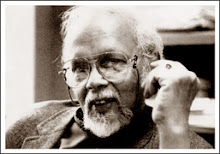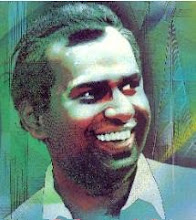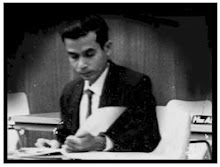Date:14/09/2010
Source: Daily Mirror

Daily Mirror online speaks to the renowned writer and director Jehan Aloysius about theatre in Sri Lanka, Centerstage Productions and more...
Q: What got you interested in theatre and when did you know this was your calling?
A: I always wanted to be a film director but the scope for film in Sri Lanka is not huge, so for me it was a more convenient sort of shift to theatre. I had more access to plays and scripts and actors and I was able to go into directing and things like that. So it was in school with the drama competition and writing plays, some of the plays that I’m working on now like Bengal bungalow were written when I was fifteen years old at the back of my class; so that’s when I started.
Q: You founded CentreStage productions which is an amateur theatre group, what progress has it made in fostering and helping local talent?
A: I founded CentreStage Productions in 2001 and over the last ten years we’ve been using theatre for psychosocial development for teaching of English as a second language through theatre, formulating techniques for second langue acquisition as well as teaching children to play again. Using it for forum theatre to grapple with social issues, we’ve been working with NGO’s and communities that need support and would like to find group solutions to personal and individual issues. What drives me is a need to really change the world through theatre. I feel that you can do that by just changing one or two people in a community, you can’t really change the world by clicking you fingers. I believe that theatre is a very strong tool in changing the way people think through social theatre and things like that.
Q: You also worked with the Sunera foundation for ‘An inspired swan lake’ would you work with them again or another group like them?
A: We would like too, we are always looking for partnerships with organizations that require our services and my team is always ready to take on new challenges. Working with the Sunera foundation as well as the Ranaviru Sevana for the soldiers, that was a challenge because we had not previously worked with people with psychical and mental challenges; I tend to use the word challenge rather then disability because we believe in always finding the positive rather then the negatives.
We found that the whole process especially for the soldiers was brilliant in allowing them to tap into some of the positive forces in their minds to help their recovery as well. These soldiers were auditioned just after they lost their limbs, they needed some kind of trauma therapy to get over that and the theatre project really helped them in and they feel that they want to have a future in theater, so we’ve planned a few more productions.
Q: All CentreStage productions are original works of yours, what inspires you to write these
 storylines?
storylines?A: I must admit that some of my scripted plays were written when I was in school, that was when I think most of my creativity as a writer sort of blossomed at that time. I went through a process of writing quite a number of scripts over about four to five years; strangely enough those scripts were submitted for the Gratiean award and they were short listed for the Gratiean. Later on I did work with the royal court theatre of London and we worked on the ritual and plays like that, there I got grounding more into structure and that kind of writing.
Right now I think what inspires me to create new works is the troupe that I have, I have a very dedicated cast, some of them have been working with me for the last ten years and some of them from the time they were in school, that’s before I’d even started centre stage productions. I try to structure the new plays, we call them devised plays and they play on the strengths of the team so I’ve got dancers, singers and performers from down south who are acrobats and dancers. I try to structure the shows to best show case their abilities as well.
Q: Why do you choose to include dance in all your plays?
A: I use dance to actually take forward the narrative of the play rather then a show stopper like a dance for the sake of dancing. I was very impressed with the kind of work that these actors put on when I did an inspired swan lake and that was a ballet; I took on Tchaikovsky’s Swan Lake which is a very difficult piece, tough musically as well as to actually perform it and we created our own form of dance called ‘Body narratives’ and People now use that term body narratives.
Q: How do you go about selecting actors for there roles, what are you looking for?
A: I think it depends on the play, for example when working on Bengal Bungalow, I was looking for people that were able to handle an accent or dialect, it didn’t have to be an authentic dialect, we have British characters and Indian characters. The characters are almost caricatures, almost like Ray Cooney classic British farce meets the Simpson’s’ I was looking for actors who were able to deliver the dialect as well as the punch lines, comedy also relies a lot on setting up for jokes that would come into execution in the second half of the play for example so you’ve got to get the words out there.
I was looking for young talent for this production, also to give opportunities to new people. When I do serious theatre I tend to use more established actors that I’ve worked with because of the experience that they have, they bring a lot into the rehearsal; so I think when your choosing the actors you’ve also got to think of the kind of play that your doing.
 Q: Can you tell me some thing about the cast for Bengal Bungalow?
Q: Can you tell me some thing about the cast for Bengal Bungalow?A: There are talented new faces to watch out for; I’ve decided to work with a youthful troupe, we went through an extensive audition process of about three months for it. I’ve been really thrilled to meet these new performers because I feel that they have a great future they’ve got the kind of commitment that you need, as an actor you need to commit a lot of time and energy before the rehearsal as well after the rehearsal because you’ve got to remember your lines and remember the notes the director gives.
I think for a play like Bengal Bungalow, the audience will be in for a surprise, they’ll see some new talent strutting their stuff. We’ve got actors like Annabella Brochard, Dino Corera, Sachintha Dias, all new talent. We’ve got a couple of very new guys who’ve never really been on stage who were working backstage and things like that but now they are playing lead roles.
Q: Why did you decide to channel the proceeds from this show to theatre workshops when you have StageHands Production?
A: CentreStage Productions is our theatre group but when we have any profits we use part of that towards our StageHands Project because we don’t have funding for it; it’s not an established charity and we don’t have people who really donate anything. Most of our plays other then maybe this play have been without any sponsors. We need financial backing and StageHands Project is a volunteer project, we go into communities and we work with them and for transport, accommodation and for conducting the workshops things like that, we need funding.
We channel some of the proceeds from the play towards that as well as of course taking care of CentreStage Productions and our expenses that’s why we need audience members to come and see the play and support the show and support our work, by supporting centre stage productions they are actually supporting the stage hands project and all the work we do around the island.




































No comments:
Post a Comment